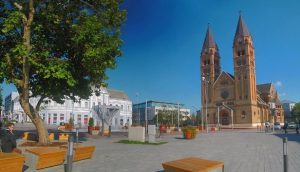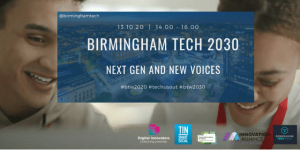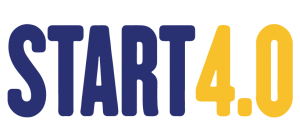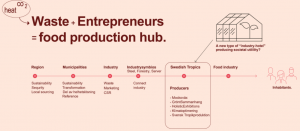
An ecosystem is like a finely tuned Swiss watch. Poetry in motion if you have all the relevant cogs and springs in place, but with one wheel out of kilter, the movement can go to pot. Investment in people and skills is the oil which helps to keep the innovation ecosystem ticking along. The Interreg NW Europe project Better- stimulating innovation through better ‘e’ government services, hosted its fourth and final thematic event online, focusing on people and skills on 3rd November 2020. Both Birmingham City Council and West Midlands Innovation Alliance participated in the event which was led by Nyíregyháza, Hungary. The overall aim of the Better project is to foster a policy environment where innovation can flourish. In the Birmingham context, there is a focus on influencing the West Midlands Innovation Fund to achieve a 10% increase in innovation.
Samu Szemerey, the Hungarian expert, provided an insight into the various parts of a well-functioning eco-system, placing people (and their understanding of the ecosystem) and their skills at its heart. He provided an interesting example of how innovation can succeed or fail depending on whether the right ecosystem support structures are in place and how, regardless of policies or strategies, a city needs to embrace a culture of innovation in order to succeed. In Budapest in 2009, a car-sharing initiative sprang up spontaneously as a response to a local transport strike; it was very similar to the Uber model which also was established that year. The Budapest example was practice driven, responding to a specific need, it was innovative, having private individuals sharing their car and organised by mobile phones and Facebook. Why did Uber become a global company whilst the similar initiative disappeared? According to Samu, the lack of ecosystem meant the Budapest example never took flight. The city and transport company failed to see how the model could be integrated into the transportation network and thus help the city become more sustainable.
Further examples of successful ecosystem/ initiatives supporting people and skills from the five transnational partners included:
1. Technology Transfer Centre: Nyíregyháza

One way the ecosystem was strengthened in the Hungarian city of Nyíregyháza has been addition of a Technology Transfer Centre. Opened at the beginning of 2020 and inspired by Barnsley UK’s, Digital Media Centre, the centre focuses on digitalisation and has a multi-functional purpose, including: investment in people and skills, economic development and business support. The centre promotes an ethos which is keen to ensure both the attraction and retention of young talent by creating a dynamic, appealing environment. This focus addresses a major societal challenge caused by the out-migration of highly educated, young people. It is hoped that the centre will be a catalyst for high value jobs and investment that will challenge the current situation where companies locate there for cheap labour via a low-skilled work force. The strategy under-pinning the approach is one of value extraction, whereby infrastructure is exploited to generate high value jobs. (currently no website available)
Nyíregyháza’s inspiration…
 The inspiration for the centre resulted from an URBACT Tech Revolution project which brought together Nyíregyháza and Barnsley Council. Barnsley developed a successful business support programme and a landmark hub for creative and digital business in the town centre which inspired the Hungarian partner.
The inspiration for the centre resulted from an URBACT Tech Revolution project which brought together Nyíregyháza and Barnsley Council. Barnsley developed a successful business support programme and a landmark hub for creative and digital business in the town centre which inspired the Hungarian partner.
Barnsley’s transformation from a town dominated by the coal industry (till the 90s) to an economy revitalised by the creative and digital economy was underpinned by a powerful vision. To realise this vision, the ‘Enterprising Barnsley’ team worked to build relationships with companies, helping them to embrace the digital agenda and grow. The Digital Media Centre opened in 2007, with the council taking direct management of it in 2015. At this point the focus shifted with the recognition that the power of the centre lay in its dual function as both a platform and a physical space. Having an open-door policy with a welcoming, community space, the centre was successful in bringing people and ideas together. A community of businesses, creatives and digital was quickly established. A key ambition was to drive digital adoption, so the centre ran programmes such as Connected Healthcare, plus a programme targeting manufacturers to improve workforce skills and increase turnover. Barnsley had bigger ambitions still and was keen to create high value jobs, but at the same time recognised it needed a better skilled workforce. A robust, co-created solution emerged by bringing together the right people: decision makers, money, citizens. The result was a co-created DMC.2 digital campus, called The Seam which brings together business, education, people in one place. A local education college has transformed one of their buildings into a digital skills hub and is an integral element of the new hub. The college goes beyond the digital curriculum and ensures every student has digital skills.
Capitalising on the momentum created, Barnsley worked in partnership to secure funding from a national innovation agency to run an IoT Tribe accelerator resulting in 10 companies receiving very intensive business support to develop their company and customer base. Barnsley’s international profile grew as a result as 10 global start-up companies were attracted to the initiative. These were located as far afield as Columbia, Poland and Russia. Such was its success, an additional 30 international companies came, including one from Singapore! Now there is a third cohort. The key to success, according to Tracy Johnson, Director of the Barnsley Digital Media Centre is having access to a small amount of money, plus willingness to take informed risk and accepting things may go wrong. The result of this is that rather than going to big companies when the council needs IoT solutions, they now approach the IoT Tribe companies for innovative solutions. In this way, Barnsley Council has positioned itself at the heart of the tech ecosystem and is truly an enabler of opportunities.
For further information, go to: https://www.barnsley.gov.uk/news/phase-two-of-techrevolution-to-begin/
2. The School of Code, Birmingham

What happens when you missed out on university, didn’t recognise your inner digital talent or chose a university course with no digital skills content? Well, if you have a spare £10,000 in your back pocket you can enrol on a coding course in New York or London, or alternatively, you can get yourself a place on the School of Code boot camp in Birmingham for free. Brainchild of Chris Meah PhD, this skills accelerator recognises the lack of diversity in tech. It offers an opportunity to level up through providing access to a supercharged training course for people who don’t have digital skills. The boot camp plugs a gap in the skills market, responding to employers needs for digital skills not provided through traditional educational routes. Intensive training is provided over a 16-week period to attendees who are work ready at completion. An impressive 90% find employment including former bakers, farmers and work-at-home mums. The course is funded by the employers who need the talent now and are willing to pay the costs to get the employees they need, rather than the cost being the responsibility of the learner.
For further information, go to: https://www.schoolofcode.co.uk/
3. New Voices of Innovation, Birmingham
 The power of role models to inspire future generations is undisputed. Birmingham and the West Midlands is incredibly diverse and is home to a rich source of digital talent. The New Voices of Innovation platform gives young, ethnically diverse people, who don’t normally get a platform, visibility. It is a rich and diverse database of people that cannot only inspire our next generation of innovators but also act as ambassadors for diversity in innovation.
The power of role models to inspire future generations is undisputed. Birmingham and the West Midlands is incredibly diverse and is home to a rich source of digital talent. The New Voices of Innovation platform gives young, ethnically diverse people, who don’t normally get a platform, visibility. It is a rich and diverse database of people that cannot only inspire our next generation of innovators but also act as ambassadors for diversity in innovation.
For further information, go to: https://innovationwm.co.uk/events/birmingham-tech-2030-next-gen-and-new-voices/
4. Competence Centre 4.0: Italy
 Genoa is home to one of Italy’s eight Competence Centres supported by the Ministry of Development. Industry 4.0 is the latest wave in the digital revolution and the centre supports development in this field. For the uninitiated, Industry 4.0 is the application of smart technology and the Internet of things (IoT) to boost industrial companies output through digital transformation. The Centre’s strategic objective is to provide guidance to SMEs regarding 4.0, giving them insight in assessing their digital and technological maturity, providing training for 4.0 competencies and promoting implementation of innovation. The centre also offers training including Masters’ courses with the University of Genova e.g. MSc. Cyber security, plus further training around: 4.0 capability, digital transformation, cyber security, data science and IT. Support with digital infrastructure is available in various fields, including energy, water, transport, port and 4.0 industry.
Genoa is home to one of Italy’s eight Competence Centres supported by the Ministry of Development. Industry 4.0 is the latest wave in the digital revolution and the centre supports development in this field. For the uninitiated, Industry 4.0 is the application of smart technology and the Internet of things (IoT) to boost industrial companies output through digital transformation. The Centre’s strategic objective is to provide guidance to SMEs regarding 4.0, giving them insight in assessing their digital and technological maturity, providing training for 4.0 competencies and promoting implementation of innovation. The centre also offers training including Masters’ courses with the University of Genova e.g. MSc. Cyber security, plus further training around: 4.0 capability, digital transformation, cyber security, data science and IT. Support with digital infrastructure is available in various fields, including energy, water, transport, port and 4.0 industry.
For further information, go to: https://www.start4-0.it/
5. Smart, Sustainable Cities and Societies: Gavle, Sweden
The example provided by Gavle shed light on a project implementing a novel approach to build sustainable cities and communities through smart solutions. The project set about tackling complex problems in the field of sustainable development by implementing a democratic, horizontal approach to identifying a solution. By coalescing all the actors involved in the issue, and then by working through the problems through a series of workshops (9 workshops over 10 weeks), teams were able to devise co-owned solutions. One result of this process is demonstrated in the slide below. This example highlights how a food production hub was created by bringing together excess heat to provide a power supply and create a ‘growing hub’.


A further example, ‘The good life in Gavle 2030’ project was designed to generate an idea of what a good and sustainable life in Gavle will look like in 2030. It is open to all schools and subjects to participate and connects secondary school students to their physical city environment encouraging them to develop solutions and a vision for what a sustainable life will look like in 2030. The programme starts with a bus tour of Gavle where pupils are introduced to the city, the plans and challenges. Pupils are put into small groups to work through their ideas including utilising digital skills. Both their ideas and solutions are presented to a wide audience at a sustainability council. One idea was the creation of the Garden of Harmony near Gavle University http://detgodalivetigavle.se/
These were just some of the inspiring examples provided at the event. What came across through the workshops was the enormous demand for digital upskilling either within or outside a formal educational context. Role models have an important, motivational part to play in encouraging more people to update their skills as does demonstrating the power of digital to provide sustainable solutions. The next phase of the project requires each partner to reflect on the practices they have seen, undertake a deep dive into their minutiae to evaluate their relevance to the local context and then trial them. Watch this space to see what happens next…
For further info, please contact Heather.Law@birmingham.gov.uk.




